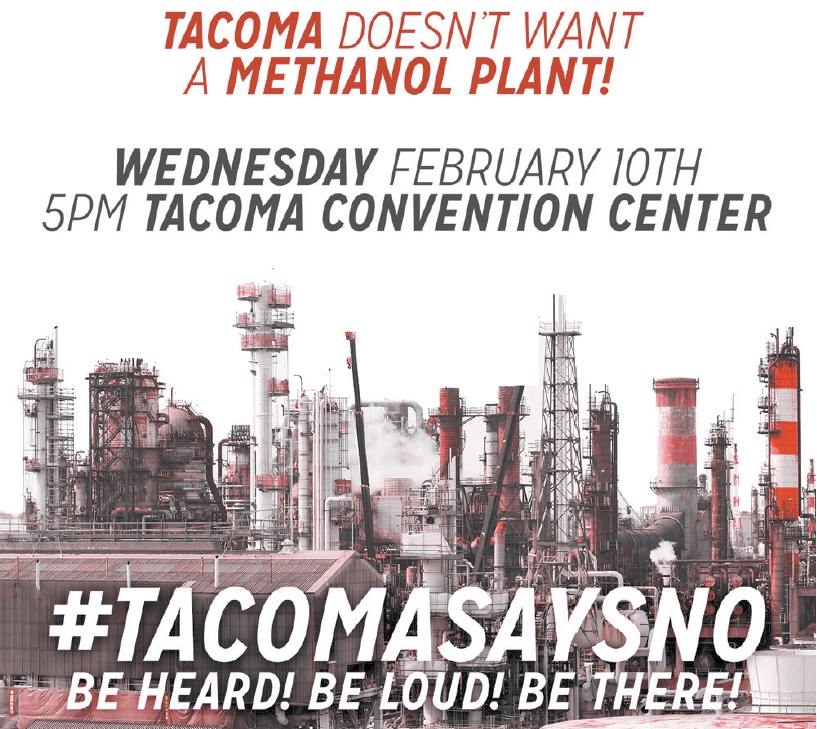Methanol Plant Public Scoping Session Proves Surprisingly Impressive
I consider myself a fairly responsible citizen. I respect the rule of law (for the most part), I vote in all local, regional, state, and national elections, and I read the news. But as far as civic functions are concerned, I’m not interested.
My aversion to all political functions stems from a town hall meeting I attended in Puyallup about four years ago. It was organized by Rep. Adam Smith and its purpose was to discuss ideas about the national budget.
It was a nightmare. Of the many people who wished to speak, 100% had nothing to say about the topic at hand. Everyone had their own axe to grind, and there was no theme, no coherence… no point. I was frustrated that I had wasted my time and gas, and that these people had wasted the congressman’s time and their own opportunity. I thought to myself, “Never again.”
So I was less than thrilled when my environmental studies professor planned a class trip to a public scoping session for the proposed methanol plant in downtown Tacoma. I did not want to listen to two hours of ranting. But, diligent student that I am, I showed up prepared to take notes. The project managers announced that 110 people had signed up to speak. Each speaker had three minutes to say their piece.
The first two speakers were Chris McClain, the political director of the Iron Workers Local Union #86 and Bruce Kendall from the Economic Development Board for Tacoma-Pierce County. They spoke in favor of the methanol plant and were met with polite silence and a few scattered applauses. Hmm… good so far.
But that was the end of the pro-plant speeches. The remaining speakers that I heard (approximately 30) were decidedly anti-plant. The first anti-plant speaker—the Rev. Jenny Phillips—was not worrisome. She represented the United Methodist Church, which didn’t work against her in my mind, but her argument began with a need to repair our relationship with God. While this may ring true for many people, it seemed too vague a plea to be helpful. She mentioned fracking, but only cursorily. I started to worry that I was about to sit through two hours of similarly abstract, mostly emotional appeals with little basis in economics, health, or chemistry.
But there was another speaker from the church. Chemistry teacher Laura Baumgartner mentioned the likelihood of the plastics being manufactured in China ultimately ending up in water as trash—a great point. Before Baumgartner, Jessie Dye, the program and outreach director of Earth Ministry, brought up the dismal safety record of the methanol refinery industry as a whole.
These were good arguments. And they stayed good. Ron Richardson, Executive Vice President of the Hotel Workers International Union, pointed at the severe environmental damage the Asarco smelter inflicted on the area. Architect and planner, Jim Merritt, referenced Tacoma’s improving reputation and the risk housing the world’s largest methanol plant would pose to it, and Bill Kupinse, a faculty member from the University of Puget Sound, wondered how detrimental the plant might be for student recruitment to the area.
Claudia Riedener, a member of the Central Neighborhood Council (CNC) of Tacoma, expressed anger at the lack of communication between the Port of Tacoma and the CNC, especially considering the CNC was founded precisely to gain consensus from Tacoma residents before big projects are undertaken. Suzanne Skaar, an operations manager for the Tacoma Human Rights Commission, felt that the citizens of Tacoma were underrepresented in the decision-making process. Julia Galleher, who works as a real estate broker for Keller Williams Puget Sound, cited a study that showed that properties within a half mile of hazardous industrial sites drop 11% in value.
But my favorite lines of the evening came from ordinary citizens. Joseph Taliento, in response to a statement made by the director of Tacoma’s Planning & Development Services, rebuffed him with, “This is not encouragement. This is widespread dissent.” Alan Gorsich raged, “I am appalled—but not surprised—that it took this long before anybody I knew had even heard about this plant.” Tacoma resident Evan Purcell memorably stated, “I understand the need for good jobs in this city… but I want a job that doesn’t come with a ‘blast zone.’” And UWT alumni Roxanne Murray ended her speech with a particularly poignant quote from a Cree Nation prophecy, “Only when the last tree has been cut down, the last fish been caught, and the last stream poisoned, will we realize we cannot eat money.”
To top it off, sixth-grader Baxton Houghton spoke out in defense of the Tacoma he wants to grow up in and Rus Higley, a member of the Sustainable Tacoma Commission, resigned.
I was absolutely blown away. This was not the disorganized, self-involved, ranting public I had pictured. This was a passionate, very well-educated, organized, and determined crowd. And this was the second round of talks!
I came into the session thinking that the methanol plant was not such a big deal. This was probably just a big crowd of people all worked up over nothing. But after watching these people passionately defend their stances with excellent counterpoints and well-researched concerns, I changed my mind.
The environmental and economic impacts this methanol plant would make are debatable. What is not debatable is that the residents of Tacoma do not want it and they are willing to do whatever is asked of them in order not to have it. Their commitment was inspiring and respectable. They officially won me over.






